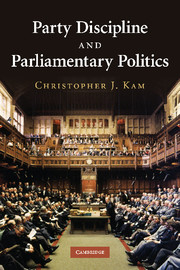Book contents
- Frontmatter
- Contents
- List of figures
- List of tables
- Acknowledgements
- 1 Introduction
- 2 A model of intra-party politics
- 3 Patterns of backbench dissent in four Westminster parliamentary systems, 1945–2005
- 4 Policy preferences and backbench dissent in Great Britain and Canada
- 5 Dissent, constituency service, and the personal vote in Great Britain and New Zealand
- 6 The cost of dissent to the party
- 7 Demotion and dissent in the Canadian Liberal Party, 1991–1997
- 8 Discipline and dissent in the Australian Coalition, 1996–1998
- 9 Career trajectories, socialization, and backbench dissent in the British House of Commons
- 10 Conclusion
- Appendix 1 Comparative statics and proofs
- Appendix 2 Content and construction of ideological scales
- Appendix 3 Sampling and coding of media dissent and discipline
- Appendix 4 Demotion and the parliamentary careers of Canadian MPs
- References
- Index
1 - Introduction
Published online by Cambridge University Press: 03 July 2009
- Frontmatter
- Contents
- List of figures
- List of tables
- Acknowledgements
- 1 Introduction
- 2 A model of intra-party politics
- 3 Patterns of backbench dissent in four Westminster parliamentary systems, 1945–2005
- 4 Policy preferences and backbench dissent in Great Britain and Canada
- 5 Dissent, constituency service, and the personal vote in Great Britain and New Zealand
- 6 The cost of dissent to the party
- 7 Demotion and dissent in the Canadian Liberal Party, 1991–1997
- 8 Discipline and dissent in the Australian Coalition, 1996–1998
- 9 Career trajectories, socialization, and backbench dissent in the British House of Commons
- 10 Conclusion
- Appendix 1 Comparative statics and proofs
- Appendix 2 Content and construction of ideological scales
- Appendix 3 Sampling and coding of media dissent and discipline
- Appendix 4 Demotion and the parliamentary careers of Canadian MPs
- References
- Index
Summary
Yet day after day with a Prussian discipline [British MPs] trooped into the division lobbies at the signals of their Whips and in the service of the authoritarian decisions of their parliamentary parties … We are so familiar with this fact that we are in danger of losing our sense of wonder over them (sic).
(Beer 1965, pp. 350–1)Beyond the party-as-unitary-actor assumption
On 9 November 2005, Tony Blair's government lost two successive votes on its Terrorism Bill. The government's sixty-five-seat majority in the Commons was entirely undercut by the rebellion of forty-nine Labour Members of Parliament who voted with opposition MPs, first to reject the government's recommendation of a ninety-day detention period for terrorist suspects, and then to force on the government an amendment limiting the detention period to twenty-eight days (Cowley and Stuart 2005). Immediately after the defeats, British odds-makers lowered the odds of Blair leaving office before the end of the year from three to one to seven to four (Guardian, 10 November 2005). This was a rare event inasmuch as it was the first government defeat at Westminster in ten years, but it was hardly novel or trend-setting. Blair's predecessor, John Major, had suffered four parliamentary defeats during his term of office, being forced on one occasion to use a confidence motion to force rebellious Eurosceptic Conservative MPs to support the Social Chapter of the Maastricht Treaty, the measure the rebels had helped to defeat the previous day.
- Type
- Chapter
- Information
- Party Discipline and Parliamentary Politics , pp. 1 - 20Publisher: Cambridge University PressPrint publication year: 2009



